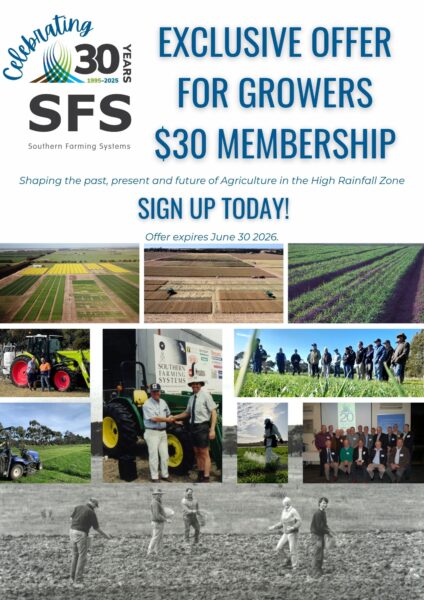
Stubble Management and the impact of stripper/disc systems in the HRZ
Large stubble loads are a continuous decision for growers in the high rainfall zone, and there are various management techniques which can be implemented to utilise or remove left-over stubble from the previous growing season. Retaining high loads of stubble can be problematic for growers as it can harbour pests and diseases and can cause logistical issues at sowing the next year, both of which can lead to poor establishment of the following seasons crop. Southern Farming Systems are lucky enough to have gained a 2-year project from GRDC focusing on various forms of stubble management and the machinery involved throughout sowing and harvest to evaluate the effectiveness of the management techniques and machinery and the potential benefits to soil nutrients as a result.
The project aims to evaluate a range of stubble management techniques such as burning, grazing, bailing, and incorporating to soil. Each of these management decisions can impact the amount of stubble left in the paddock which ultimately effects the condition of the paddock prior to sowing the next year. The conditions can include nutrients within the soil, pests and diseases and even soil water.
A secondary aim of the project is to identify the effectiveness of disc seeders and stripper fronts in large stubble loads. Disc seeders allow for improved efficiency sowing into retained stubble however there is questions posed on the efficiency of IBS and pre-emergent herbicides along with increased disease and insect pressure. Stripper fronts also pose potential efficiency improvements throughout harvest by increasing the speed and capacity headers operate as they are threshing less biomass. This machinery can then be compared to the conventional tyne and draper front systems to determine the effectiveness of each in various stubble loads.
The project is still looking for growers who would be interested in taking part in this project and be a part of ‘grower groups’ to have their say on what treatments they would like to trial and express their expected outcomes of the project in South West Victoria. This is a great chance to be a part of a paddock scale trial to test different management techniques without the upfront cost of new machinery. If you would like to register your interest or get more information please contact Trent Williamson E: twilliamson@sfs.org.au

